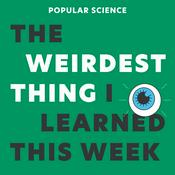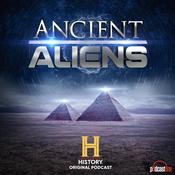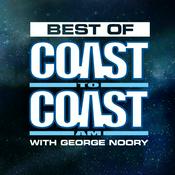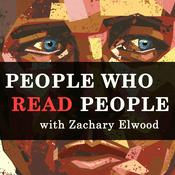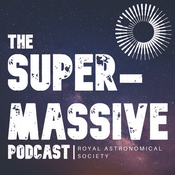96 episodes
- We're bringing back one of our most loved episode on Founders in Arms.
Parag Agrawal is the co-founder and CEO of Parallel, building infrastructure for the agentic web. Previously CEO of Twitter, Parag now leads a company architecting how AI agents will interact with the open web at orders of magnitude beyond current human scale. Two years after founding in stealth mode, Parallel recently announced a $100M Series B co-led by Kleiner Perkins and Index Ventures.
What you'll learn:
Why everything built for human web consumption will become irrelevant when agents become the primary users
How Parallel's APIs enable agents to search, fetch, and monitor the web with unprecedented scale and speed
The evolution from simple tool calls to autonomous sub-agents with real decision-making capability
Why the web must transition from "pull" (searching on demand) to "push" (alerting when conditions are met)
The new business models needed to compensate content creators in an agent-driven web
Parag's counterintuitive approach to fundraising: why VC rejections don't sting but customer rejections do
The rational game VCs play that founders misinterpret as genuine enthusiasm
Why Parag believes we're not in an AI bubble—but an overreaction is coming (and it'll be faster than dot-com)
How Parallel built quietly for a year before product-market fit arrived with the agent explosion
The operational philosophy of extreme in-person collaboration that shaped Parallel's early culture
In this episode, we cover:
(00:00) Introduction and Parallel's mission
(01:02) What Parallel's APIs enable for AI agents
(02:43) Practical examples: coding agents, sales automation, research
(04:57) The conviction bet on agents before the market existed
(10:54) New business models for content in the agentic web
(20:22) The $100M Series B fundraise and going public
(23:03) Why Parallel built in stealth with carefully chosen early customers
(24:55) Current scale and product offerings
(30:42) The evolution from tools to sub-agents to push-based web
(33:13) Are we in an AI bubble? Parag's nuanced perspective
(36:34) The mental models behind fundraising vs customer rejections
(38:37) Why VC enthusiasm is rational strategy, not signal
(45:37) Biggest career mistake: delaying Twitter's algorithmic timeline
(48:28) The compounding cost of six-month delays
(50:09) Finding inspiration in "re-founders" like Satya Nadella
(51:54) The most rewarding part: watching customers do unexpected things
(52:43) In-person culture and the transition to remote-friendly Building a Services Business in a Tech World with Honey Homes' Vishwas Prabhakara
2026/2/13 | 53 mins.Vishwas Prabhakara is the co-founder and CEO of Honey Homes, a subscription home maintenance service that's reimagining how Americans care for their homes. After spending four years at Yelp running the restaurant business, Vishwas saw firsthand why marketplaces fail for skilled home services—and built a contrarian solution. Now operating across San Francisco, LA, Chicago, Dallas, and Austin with 3,000+ members, Honey Homes creates quality jobs for skilled workers while delivering consistent, reliable home maintenance to homeowners.
What you'll learn:
Why the marketplace model fundamentally fails for skilled labor and home services
The counterintuitive insight behind every successful consumer business (the Airbnb lesson)
How Vishwas discovered workers were shocked that "nobody's yelled at me yet" after joining Honey Homes
Why solving both sides of the market—customer experience AND worker quality of life—is essential
The role of AI in leveling up service workers and automating operations without replacing humans
Why early compromises on hiring and standards compound into major problems later
The distribution challenge: getting consumers to prioritize chronic home maintenance needs
How altruism, not just incentives, drives consumer referrals and growth
Why companies like Yelp, Peloton, and Lyft deserve more respect for building culturally relevant businesses
The mental model shift required to sell subscription home services vs. one-time fixes
In this episode, we cover:
(00:00) Introduction and the respect successful companies deserve
(01:12) YC batch memories and feeling "late" to tech trends
(03:05) The genesis of Honey Homes and why Immad and Raj invested
(04:50) Growing up with a handy dad and discovering the home services gap
(06:30) The counterintuitive consumer insight behind Honey Homes
(07:03) "Nobody's yelled at me yet"—the worker experience problem
(08:11) Why marketplaces don't work for skilled home services
(09:48) Hiring only 1% of handyman applicants
(14:07) Building trust through consistent quality and W2 employment
(19:31) How altruism drives consumer referrals, not just incentives
(21:51) Getting AI-pilled at Vinod Khosla's CEO retreat
(23:01) Using AI to level up workers and automate operations
(27:54) Overcoming the mental model barrier for subscription home services
(30:07) The vision compromise lesson: don't settle on quality early
(31:44) The critical importance of distribution for consumer businesses
(32:26) Why partnerships aren't the answer (yet) for Honey Homes
(38:41) Defending Yelp, Peloton, and Lyft against Silicon Valley discourse
(42:18) Unit economics challenges in services businesses
(47:10) Role models: Jeremy Stoppelman and Ramit Sethi
(48:08) Hope that divisiveness is a passing trend
(49:35) The daily challenge of building before the world sees it
(51:04) Getting feedback about being "unpredictable" and staying in your head
(52:33) Bringing people along for the journey in your mindInstacart's Max Mullen on Building Instacart and the Future of AI: First Live Founders in Arms
2026/2/10 | 42 mins.What does it take to build a company in a category where everyone says the idea is dead? In this special live recording from Mercury's San Francisco office, Immad Akhund and Raj Suri sit down with Max Mullen, co-founder and former Chief Product Officer at Instacart, for an honest conversation about the founder journey.
Max shares how Instacart started in 2012 when there was no gig economy, no Uber X, and investors repeatedly told them grocery delivery was a dead idea after Webvan's failure. The conversation explores the controversial early days of building Instacart, why Max believes founder pain tolerance is the biggest moat, and the critical importance of market timing even when you're executing well.
Max opens up about the challenges of being a technical co-founder without deep technical skills, navigating co-founder dynamics, and the reality that many startup outcomes are heavily influenced by timing and luck. The discussion shifts to AI's transformative potential, with Max offering a compelling framework: software engineers are experiencing "the tip of the spear" of AI capabilities today, and this same 10x productivity leap will soon apply to lawyers, doctors, accountants, and every other profession.
He explores what AI-native companies will look like and why the next wave of startups will be built around professionals orchestrating fleets of agents. This episode offers essential insights for founders building in challenging markets, navigating co-founder relationships, timing market opportunities, and understanding where AI is creating the biggest opportunities for new companies.- SaaS companies are down dramatically—Figma is 77% off its peak. In this candid conversation, Immad Akhund (CEO of Mercury) and Raj Suri (co-founder of Lima and Tribe) unpack what's really happening in tech as we head into 2026.
They explore why the SaaS business model is under attack (hint: it's not just AI building software faster), the shift from per-seat pricing to API-driven usage, and why enterprises actually buy SaaS products—spoiler, it's not about the software. The conversation reveals how startups can now stay lean with fewer employees for much longer, with companies like OpenAI reaching $500B valuations with just 4,000 people.
Immad and Raj also dive into their personal experiences with AI agents, discussing what actually works versus the hype, why they're skeptical of consumer AI hardware, and how AI is changing daily productivity for founders. They debate Google's quiet win with the Apple-Gemini deal, why Siri is dead, and whether one AI model controlling all handsets should concern us.
The episode wraps with practical advice on what makes a compelling VC pitch in 2026, why crazy promises still work (even when timelines are wildly optimistic), and how to think about your startup's valuation as a call option rather than current worth. From Elon's humanoid robot bet to the new growth expectations (0 to $5M in 12 months), this conversation offers an honest founder-to-founder take on navigating the current landscape.
Key Topics:
Why SaaS companies are struggling and what survives
The real reason enterprises buy software (risk offloading, not features)
AI agents in practice: what works, what doesn't
Google's strategic win with Apple's Gemini integration
How to pitch VCs when expectations are 5x higher than before
Why crazy promises and long timelines still attract capital
The shift to leaner startups and API-first business models How Matic Built an Intelligent Home Robot (While Others Failed) With Mehul Nariyawala
2026/1/23 | 55 mins.Mehul Nariyawala is the co-founder and President of Matic Robotics, a home robotics company building what he calls “robotics 2.0” — intelligent, vision-first robots designed to actually work in real homes. After early careers at Nest and a prior acquisition by Google, Mehul and his team spent seven years building Matic, challenging the assumptions behind robot vacuums, consumer hardware, and how robotics companies should scale.
In this conversation, Mehul breaks down why robotics is far harder than software, why most home robots quietly fail, and how Matic approached everything differently — from vision-only robotics and in-house manufacturing to avoiding subscriptions, ads, and premature market creation.
What you’ll learn:
Why robotics is “100× harder than software” — and where most teams underestimate the work
The difference between automation and true intelligence in home robots
Why negative-NPS categories can hide massive opportunities
How Matic beat entrenched incumbents like Roomba by fixing fundamentals, not adding features
Why vision-only robotics was a risky but necessary bet
The real reason humanoid robots are still far from consumer-ready
Lessons from Nest on why some hardware categories stay defensible for decades
Why creating a new market can be fatal for hardware startups
How Matic built robots in-house in California instead of outsourcing manufacturing
The tradeoffs between subscriptions, ownership, and consumer trust
Why great hardware products must earn word-of-mouth before growth
In this episode, we cover:
(00:00) Introduction to Mehul Naryawala and Matic Robotics
(01:10) Why robotics is dramatically harder than software
(03:00) The failure modes of early robot vacuums
(05:10) Identifying opportunity in negative-NPS markets
(07:45) Automation vs. intelligence in consumer robotics
(10:15) Why vision-only robotics was a foundational bet
(14:00) Lessons from Nest on defensible hardware categories
(17:30) Why Matic avoided creating a new market
(20:45) In-house manufacturing and vertical integration
(24:30) Scaling hardware without inventory risk
(28:10) The long road from demo to product
(32:00) Why humanoid robots are still overhyped
(36:20) Word-of-mouth, product-led growth, and brand trust
(40:15) Subscription fatigue and consumer psychology
(44:30) The future of home robotics and where Matic goes next
More Science podcasts
Trending Science podcasts
About Founders in Arms
In this weekly series, fellow startup founders Immad Akhund (Mercury) and Rajat Suri (Presto, Lima, and Lyft) explore current events in the world of tech, startup, and policy, offering insights from their distinguished careers and an array of expert guests.
YouTube: youtube.com/@FoundersInArms
Substack: foundersinarms.substack.com
Instagram: instagram.com/foundersinarms
TikTok: tiktok.com/@foundersinarms_
Podcast websiteListen to Founders in Arms, The Naked Scientists Podcast and many other podcasts from around the world with the radio.net app
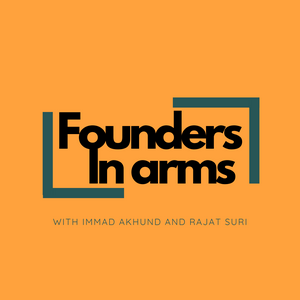
Get the free radio.net app
- Stations and podcasts to bookmark
- Stream via Wi-Fi or Bluetooth
- Supports Carplay & Android Auto
- Many other app features
Get the free radio.net app
- Stations and podcasts to bookmark
- Stream via Wi-Fi or Bluetooth
- Supports Carplay & Android Auto
- Many other app features


Founders in Arms
Scan code,
download the app,
start listening.
download the app,
start listening.















